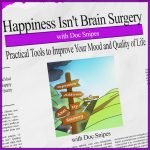
Living with ADHD
With Doc Snipes
More resources are available at DocSnipes.com
Attention Deficit/Hyperactivity
~ Difficulty getting organized
~ Chronic procrastination or trouble getting started
~ Many projects going simultaneously
~ Trouble with follow-through
~ A tendency to say whatever comes to mind without considering timing or appropriateness
~ A frequent search for high stimulation
~ An intolerance of boredom
~ Easy distractibility; trouble focusing attention, tendency to tune out or drift away in the middle of a page or conversation
~ Trouble going through established channels and following “proper” procedures
~ Impatient; low tolerance of frustration (Emotional Dysregulation)
~ Impulsive, either verbally or in action (e.g., impulsive spending of money)
~ A sense of insecurity
~ Mood swings, especially when disengaged from a person or a project
~ Physical or cognitive restlessness
~ A tendency toward addictive behavior
~ Chronic problems with self-esteem
~ Inaccurate self-observation
~ Involvement in goal directed activities
Note
~ While boys are diagnosed with ADD three times more often than girls, this is likely because, in girls, the disorder typically presents as the “inattentive” or “dreamy” type (staring out windows or drifting off midconversation), as opposed to the “hyperactive” type.
Things to Do if You Have ADD/ADHD
~ Get adequate, quality sleep
~ In order to do this I will…
~ This is important to my recovery because…
~ Train yourself to become more organized
~ In order to do this I will…
~ This is important to my recovery because…
~ Prioritize
~ What is most important to move you toward a rich and meaningful life?
~ This is important to my recovery because…
Things to Do if You Have ADD/ADHD
~ Control impulsive behavior
~ In order to do this I will…
~ This is important to my recovery because…
~ Develop social skills
~ In order to do this I will…
~ This is important to my recovery because…
Things to Do if You Have ADD/ADHD
~ Strategy to stop blurting
~ Make a list of the inappropriate situations in which you are most likely to behave impulsively.
~ When you are about to enter one of those situations, try following actions:
~ Before you answer someone, inhale slowly, exhale slowly, put on a thoughtful expression, and say to yourself, “Well, let me think about that.”
~ Put a finger over your mouth for a few seconds, as if you’re considering what you’re going to say.
~ Paraphrase what your boss or family member said to you: “Oh, so you want to know about…” or “You’re asking me to….”
~ Imagine locking your mouth with a key to prevent yourself from speaking.
Things to Do if You Have ADD/ADHD
~ Minimize distractions
~ In order to do this I will…
~ Small space
~ Minimize stuimuli
~ This is important to my recovery because…
Things to Do if You Have ADD/ADHD
~ Find constructive outlets for excess energy
~ In order to do this I will…
~ This is important to my recovery because…
~ My excess energy is a problem in these situations because…
~ Plan ahead/Impulse Control
~ Adults with ADHD have difficulty drawing on past experiences to guide their actions.
~ They’re not good at recognizing the subtle aspects of problems, and the various tools that might solve them. They hit every problem with a hammer, because, to them, all problems look like nails.
~ Picture a TV and imagine the last time you were in a situation like this playing on the TV like a movie.
~ What did you learn from that experience?
~ What were some of the details that made it similar and different to this situation?
Things to Do
~ Train your brain (Try Luminosity)
~ See the goal
~ Many individuals with ADHD forget the purpose of their tasks, so they are uninspired to finish them. If no one is dangling a carrot in front of them, they may need some convincing to keep moving toward their goal.
~ Imagining the negative consequences of not doing something is not a potent motivator for most people with ADHD.
~ Hint: Put a medication reminder app on your phone to remind you each morning to do your creative visualization for handling that issue
~ Imagine how great it will feel to get to your goal works better and add visual reminders of the goal—including daily creative visualization.
My Plan
~ In the next few slides
~ Identify how you have experienced each symptom
~ Identify 2 things you have done in the past that helped prevent or address the issue
Activity: My Plan for Dealing with
My ADHD
~ Chronic lateness
~ Forgetfulness
~ Anxiety
~ Low self-esteem
~ Employment problems
~ Difficulty controlling anger
Activity: My Plan for Dealing with
My ADHD
~ Impulsiveness
~ Poor organizational skills
~ Procrastination
~ Low frustration tolerance
Summary
~ ADD/ADHD can negatively impact relationships, work and addiction recovery if not addressed
~ It is more important to identify and address symptoms than worry about fitting particular diagnoses
~ Identify which symptom is most problematic for you and address that one first.
